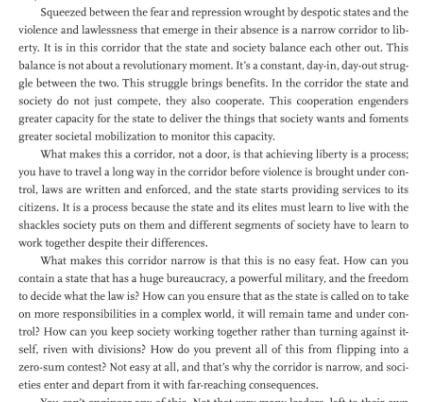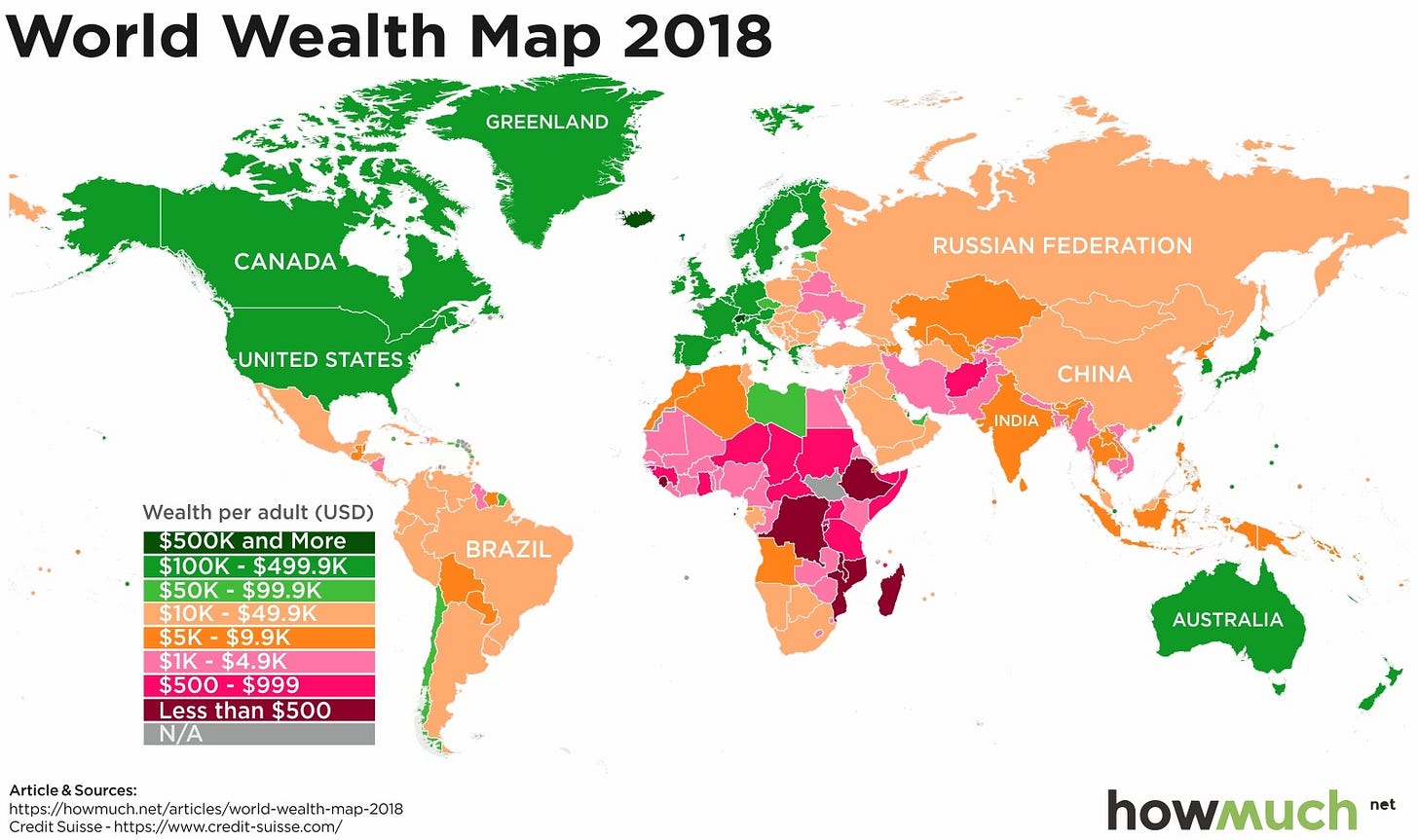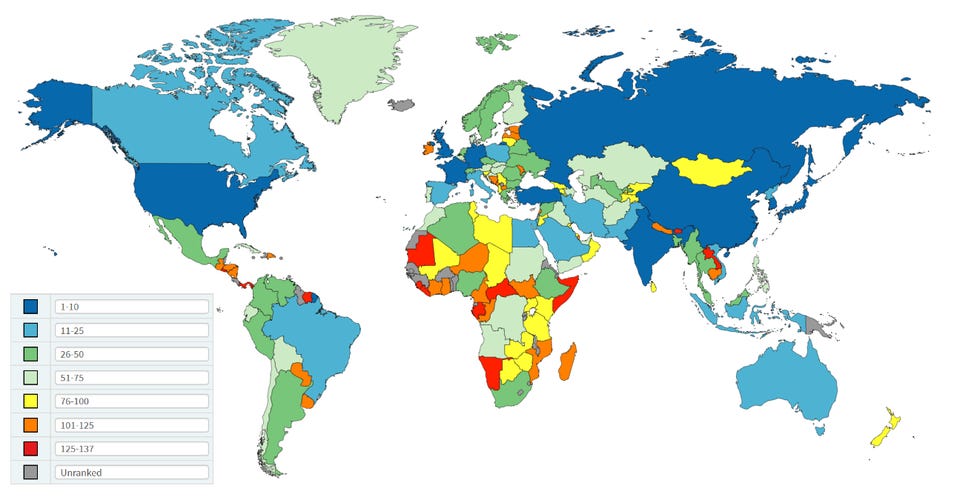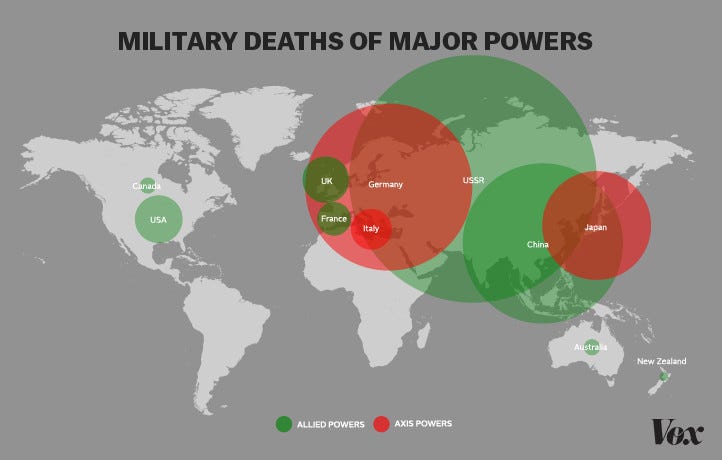On Life Support
As far as I understand, he’s saying, “Yesterday it was them and today it’s us. Let’s see what they like to eat.”
My readers have made two requests:
1) Keep it shorter;
and (amazingly),
2) Make it easier to pay.
Seriously. Several of you have written to say you don’t like PayPal. Unfortunately, Venmo isn’t available in France. But I offer these three handsome options:
Actually, a fourth should work. I believe you should be able to send money via Transferwise. But I haven’t checked to be sure that works: Try it and tell me what happens.
Things we would prefer to forget
We have preferred to forget that in the nuclear era, our security rests upon the ghastly logic of mutual assured destruction—a doctrine that relies upon our ability to convince our adversaries that we would destroy the the world before submitting to enslavement. There is no other doctrine upon which our security might rest. A nuclear war cannot be won. Ballistic missile interception is unproven.
The purpose of deterrence is to ensure we do not go to war. The United States has enemies who would, undeterred, revise the world’s borders by force.
The two pillars of deterrence are capability and will. The first requires a military strong enough to inflict incalculable damage on an aggressor, the second, signs that we are willing to use it. The failure of deterrence means conquest or war, and war in the nuclear era means the end—to everything.
For deterrence to be credible, it must be clear and unconditional. The President’s behavior has cost us this clarity and credibility, severely undermining our deterrence. What is worse, Candidate Trump made his intention to undermine our deterrence explicit, but Americans voted for him nonetheless.
Our allies and adversaries in Europe have thus widely, and correctly, concluded that the American people are no longer committed to Europe’s defense. This is equivalent in effect to destroying the other pillar of deterrence: capability. We might as well have sunk our own blue water fleet.
The American military is the only thing of its scale that has ever been built with the intention that it never be used. It does not exist because Americans want to go to war. It exists because Americans—sane ones, anyway—want to live in peace. It is extraordinary, then, that Trump’s destruction of our deterrent has elicited cheers from so many Americans. They are the ones who pay trillions in taxes to pay for a military strong enough to deter an adversary, one that absent the signal of will is just a dangerous and ludicrously expensive bauble. Trump has taken a match to their tax dollars and set them alight.
But of course, it is not just their fortune he has carelessly (or deliberately) torched. It is their lives, and their children’s lives, that he has put at risk. None of this seems to have dawned on us. A large number of Americans are sincerely thrilled. They believe Trump stuck it good and hard to our freeloading allies, and put them in their place.
Liberal Democracy and the West
What are we talking about when we talk about “The West? Many things, of course. But for our purpose, “The West” exists both as an abstraction and a distinct geographic region: It is the territory under the umbrella of the North Atlantic Treaty Organization, comprised, as the acronym suggests, of countries that ring the northern half of the Atlantic Ocean. The United States and Canada are half of the West, and Europe is the other.
Collectively, Europe is larger, wealthier, and as powerful militarily as the United States. It is the only other region of its size that has put the ideals of liberal democracy into practice. This is why it matters. This is why “Western values” matter.
The phrase “Western values” is sometimes used as a casual synonym for “liberal democracy.” The term has fallen upon disfavor among those who argue, correctly, first that these are universal values; second, that the West has not always embraced them. When Mahatma Gandhi was asked what he thought of Western civilization, he replied that he thought it might be a good idea; if the comment was glib, it was also devastating. The West’s propensity to descend into barbarism should humble us.
But it must not prevent us from recognizing that the postwar West has built more flourishing liberal democracies than any other region of the globe. The West is dense with states that fall into what Daron Acemoglu and James Robinson call “the narrow corridor,” wherein the state is strong enough to protect the weak from predation by the powerful, but weak enough for people to protect themselves from the state.

The soil of Europe is drenched in blood from the catastrophe of the wars. The descent of the world’s most civilized people into a madness and barbarism previously unimaginable to the human mind has left mankind permanently broken. We will never recover from it. Europe lost its ability to believe in its civilizing mission. The imperial program stood exposed as a project of naked conquest and violence.
Why then is Europe is in that corridor? Is it because it is the inheritor of colonialism’s ill-begotten gains? Is Europe rich because the rest of the world is poor?
No.
In 1945, Europe lay in ruins. It had been was destroyed—razed—by the war. It had squandered every bit of the wealth from the colonies. It faced starvation.
As this memorandum from Under Secretary of State William L. Clayton’s to Dean Acheson makes clear, the United States, not the colonies, rebuilt Europe—and it did so because American leaders understood, following two world wars, that it would overwhelmingly be to the world’s benefit—and to the benefit of the United States, in particular—to ensure that Europe cease exporting its centuries of violent conflict. Europe, they concluded, must be prosperous and peaceful, or none of us would be.

They understood as well that the American President must persuade the American people that Europe’s recovery was in the American interest, as it was:

Europe is not in the narrow corridor by an accident of history. It is there because the United States and the USSR defeated the Nazis, then the United States defeated the USSR. It is threatened, now, because the defeat of the USSR has proven to be an interlude, not a decisive victory.
It is in that zone because the United States midwifed the reconstruction of Europe through the Marshall Plan and the Treaty of Rome.
U.S. Secretary of State George Marshall, U.S. President Harry Truman and members of Congress—Republicans and Democrats alike—were in full agreement that the only way to ensure a permanently pacified Europe was to fully enmesh the feuding powers in an unbreakable economic yoke. The Treaty of Rome and its sequelae were designed to make war “not only unthinkable but materially impossible.” They were designed so that European nationalism could not be reborn. As we’ve seen in Britain, they were well designed.
What’s more, American statesmen determined that no European power should fully re-arm. Thus the United States—an external power that could function as a credible guarantor—would assume responsibility for Europe’s security. Permanently. It would credibly guarantee the security of every member of the North Atlantic Treaty Organization.
Only the United States was in a position to do this. It was a strategy of monumental foresight and brilliance.
And it worked. The postwar era has been the longest period of peace and prosperity Europe has ever experienced. Since the signing of the Treaty of Rome, the EU has grown from six countries with 186 million citizens to 28 countries with 515 million citizens—and a GDP seven times larger than in 1957. The combined EU economy, in fact, is larger than that of the United States. It is the second-biggest in the world, after China. The EU and the United States together would have nothing to fear from China. Or from Russia.
Europe is our only credible security partner.
NATO and the European Union were not build a whim. They were institutions created by men who knew Europe’s fratricidal history intimately; they were build by men who had survived it—and many of their generation had not. This was the last hope of rescuing the continent, and it succeeded.
In 1949, Paul Hoffman, then head of the Economic Cooperation Administration, or ECA, addressed the nations of the Council of the European Economic Cooperation Association and sketched out a plan for the creation of a united western European market with no customs barriers or tariffs. The ECA enthusiastically adopted the idea, laying the foundation for the European Economic Community and later the European Union.
Precisely because the idea would clearly strengthen and unite the West under the United States’ aegis, the Soviet Union’s propaganda organs went into overdrive to combat it. Communist criticism of the Marshall plan was eerily similar to the language now used by UKIP, the National Front, and other anti-EU parties and movements to criticize the European Union, and indeed by people who support these parties and movements in America—even though many such movements are intrinsically hostile to the United States.
The French paper L'Humanité, for example, like many other communist publications, wrote, “After disorganizing the national economies of the countries which are under the American yoke, American leaders now intend conclusively to subjugate the economy of these countries to their own interests.”
Here is a cartoon from the Soviet paper Izvestiya. Hoffman, depicted as a fat capitalist, is purported to be attacking “the sovereignty” of the Marshall Plan countries. The idea that the “sovereignty” of European countries was undermined by economic cooperation and low tariffs is nonsensical. Moscow was clearly the source of this idea, Moscow remains the source of this idea, and Moscow’s motives for promoting it—then and now—are entirely cynical:

A German Perspective:
Trump's Impeachment Inquiry Is Imperative for the World
Roland Nelles, for Spiegel
In the battle over the impeachment inquiry, Donald Trump has shown once again just how deft a manipulator he can be. Will it be enough? A failure of American democracy would be a disaster—and not just for the United States.
America's Founding Fathers bestowed considerable power on the country's president. He or she serves as the head of the Executive Branch, is at the helm of the administration and the military and also determines a large share of foreign policy.
Having just waged the bloody Revolutionary War for independence from the British crown, Alexander Hamilton, James Madison and the other Founding Fathers wanted to ensure, no matter what, that the president didn't rule like a monarch. In 1787, the Constitution established "checks and balances" intended to provide Congress with a major role in government affairs and oversight over the Executive Branch as essentially it's co-equal. At the same time, the president would have to respect the laws and always govern conscientiously and for the good of the people. This includes the duty to not abuse the power of the presidency to one's own advantage.
That's how a great democracy arose in the U.S., one that has been replicated around the world many times over. It is an admirable system and the foundation of America’s strength—and, so far at least, it has always functioned reasonably well. Despite all its weaknesses, the U.S. is a country that its citizens can rightly be proud of.
Deadly Serious
But now, Trump is in power, a president who doesn't seem to care much about norms. He is testing the limits of democracy in the Ukrainian scandal as he relies on tricks, cover-ups and deception. The question now is whether American democracy will survive unscathed and whether it can return to its role as the bright beacon of democracy.
This isn’t a game or some kind of cheap show—these are deadly serious times. Whenever abuse of power becomes the rule rather than the exception, whenever it is left unsanctioned, we see the door opened to despotism. A failure of democracy in the U.S. would be no less than a catastrophe for the rest of world. Just as America served as a positive example for decades, it could just as quickly become a negative role model for the many leaders around the world dreaming of omnipotence. Trump’s imitators are already hard at work around the globe, in countries like Brazil, Hungary and Italy. If he gets away unsanctioned, they would be even more emboldened to follow his autocratic impulses.
Trump’s greatest strength is his ability to warp his own reality. In doing so, he blinds his followers to the truth, ensuring their continued support. He has a tremendous talent when it comes to manipulating people, and his approach to the current scandal is further proof of that.
A French perspective
Kurds: shame and war
EDITORIAL
Le Monde
Editorial. In diplomacy, cynicism can lead not only to treason, but to tragedy. Recep Tayyip Erdogan's Turkey, by bombarding and taking a stand in the north-east of Syria since Wednesday, October 9, is not only attacking a neighboring country, it is also attacking the Kurds who rid of the West of the threat of the Islamic State (IS) organization.
The United States, by ordering the withdrawal of American special forces, has, in fact, delivered to the Turkish army the Kurdish militiamen of the YPG. This abandonment is an abuse of authority with grave consequences, committed in the worst manner: by washing his hands of it
Donald Trump, after implicitly giving the green light to the Turkish president, has hypocritically described as a “bad idea” the offensive against the Kurdish-controlled border area. The five European members of the Security Council were right to condemn it on Thursday, 10 October, and to ask "Turkey to stop [its] unilateral military action.”
This is not the first time that the Kurds, the largest people on the planet deprived of a state, have been betrayed by Washington, not the first time they are abandoned after being used. Westerners, who have never wanted to directly confront the Syrian dictator Bashar Al-Assad, the executioner of his people, were very happy to appeal to them when, in 2013, the war against the Islamists began to dominate the complex conflict.
Ruling out leaving an intermediary force on the ground, believing in the ability of the Kurdish militiamen to seize the liberated territory from Islamists, they turned a blind eye to the proximity of YPG fighters with the rebels of the Kurdistan Workers’ Party, a sworn enemy of Ankara described as “terrorists” by both the European Union and Washington.
A free hand to Russia
But the betrayal of the Kurdish allies by Donald Trump is not only an act of contempt, it is all the more serious because it is committed by a member of NATO. This is an absurdity with potentially far-reaching consequences. The shock wave provoked by this new bout of American isolationism is destabilizing a region already ravaged by eight years of conflict. Fleeing the Turkish bombing, tens of thousands of civilians will end up on the roads, creating the threat of a humanitarian crisis.
The fragile victory over IS, achieved just a few months ago, is now in question. The approximately 10,000 prisoners—including 400 to 500 French-former terrorist fighters guarded by Kurdish fighters—could take advantage of the chaos caused by the Turkish offensive, to disappear in the wild, or even start the attack.
Withdrawing, Donald Trump leaves the field open to Russia, only too happy to strengthen its influence in the region. The Turkish intervention, by arming and using anti-Assad Syrian auxiliaries eager for revenge against their Kurdish rivals, revived the war and could throw the latter into the bosom of the Syrian regime.
Violence and chaos can only make more dim the only prospect of peace: the negotiation of a status of autonomy for the Kurds within Syria.
The American withdrawal, by allowing Turkish aggression, is one of those shameful acts of cowardice that Europeans know are the harbingers of future war.
The Value of the West
Anyone who doubts the value of the West has never lived anywhere else. They have never lived in a country where life is cheap, the state is despotic, or worse, absent. I have. Take it from me: You don’t want to.
Liberal democracy and prosperity have, for most of history, been a fantasy. They remain a fantasy to large parts of the world, much of which is still suffering, enslaved, or impoverished. The West is where these eternal human fantasies have been made real. It is where liberal values have seen their fullest expression and flourishing. It is the only part of the world where these fantasies have been established, for so long, that we have become bored with it, and wonder if something else—theocracy, maybe, or small-scale anarchist collectives—would be better.
We need Europe more than ever
The West’s security is now genuinely collective. The United States cannot go it on its own.
The rise of the rest of the world, particularly China, entails that neither Europe nor the United States are wealthy or powerful enough, alone, to sustain and expand a rule-based order alone, or liberal democracy as an idea or a practice.
No European country alone can credibly sustain order. Nor can the United States alone. The United States’ world, without Europe—without NATO—would soon come to resemble Israel’s: We would be surrounded by ideologically hostile rivals, isolated, and on the losing side of a demographic war. Like Israel, we would be defended by walls and nuclear weapons—but for how long? Israel is sustained by a superpower patron. We do not have a superpower patron.
Europe and the United States, firmly allied, are powerful enough to sustain the order we inherited.
If you look at a map and calculate shares of the world’s population and wealth, this is perfectly clear:

And here is a map of global firepower:

A United Europe—and the United States—are together strong enough to sustain the liberal democratic tradition and Western values. Together, with Australia, New Zealand, and our partners in the Far East, we could credibly contain Russia and China, and defend free outposts in Asia and the Middle East.
Separated? No.
Here is what happens when you fight major wars without allies:

This is precisely why the enemies of liberal democracy have driven a stake through our seventy-year alliance.
This is why you’re told so often that Europeans are “freeloaders.” It’s why you’re told Europe has been overrun by migrants. Or that the EU is like the USSR. That’s propaganda.
It’s wartime propaganda.
The West has Two Parts
I have written this before—and published it before—but this part of the argument goes here, so I’ll repeat it. Modern Europe—liberal, democratic Europe—is the United States’ creation. This story was once known to every American, but as the generation responsible for this achievement dies, so too has the knowledge ceased to be passed down casually, within families. Once everyone’s father or grandfather had fought in the war, and so everyone knew, roughly, what had happened. Knowing it, now, requires education or an act of effort.
Mine was probably the last generation that universally understood, without being specifically taught, that the militaries of the United States and the Soviet Union together reduced Germany to ashes, divided it, occupied it, hanged its leaders, then rebuilt it (in the case of the United States and Western Europe) or imprisoned and enslaved it (in the case of the Soviet Union and Eastern Europe). We knew, without being taught, that a long and brutal twilight war followed, that at last the Soviet Union collapsed and Eastern Europe was liberated, permitting the Continent to achieved at last what had for millennia been a dream: a Europe united, whole and free.
Americans died, suffered, and labored assiduously, for generations, to create of Europe what it had never been before: a zone of peaceful, prosperous, liberal, democracies—and the other half of the West. The rescue and reconstruction of Europe was a moral and political accomplishment that has only one rival in historic significance: the founding of the United States itself.
Our grandparents destroyed the most monstrous and tyrannical regimes humanity has known. They proved that our system of governance, or something much like it, could be built and made to work on that very soil. This is the story of the world we know, and the story of our country, too. This is the accomplishment now under threat.
The world we built is the only world any American alive now knows. We take it for granted. The United States seems so mammoth and solid that it requires immense imagination to realize that nothing about our system of governance is intuitive, natural, or typical—or to recall that before we built this world, liberal democracy was a fragile and relatively untested experiment. It was our victory in the Second World War and our reconstruction of Europe and Japan that made us a global, norm-setting power, capable of defining the rules of international order. Our power and success made democracy a global aspiration—and in many places a reality.
The United States built this modern order upon an architecture of specific institutions: NATO, the United Nations, the European Union, the International Monetary Fund, the International Court of Justice, the World Economic Forum. Some of these have been more successful than others; all have acquired legitimacy of their own. American power—military, diplomatic, and economic—has undergirded it all. Whatever its faults, and of course there are many, it is by far the best global order humanity has yet achieved.
There is no reason or evidence whatsoever to believe that if it is destroyed, something better would replace it. There is every reason to believe it would simply be destroyed.
If the West is at the center of this order, it is not because European imperialism has emerged in a new guise. European imperialism is a globally loathed and discredited ideology. It has no power to capture the modern imagination or compel allegiance.
The West is at the center of this system despite its imperial past, not because of it; and it is at the center through the moral authority of liberal democracy—because we have, visibly, governed ourselves in the way people around the world would like to be governed. We have been wealthy and we have been safe; we have not died of easily-prevented epidemic disease; our women have not been enslaved; our buildings have rarely collapsed in earthquakes; our governments have generally left us alone, and they have refrained from stealing everything that isn’t nailed down.
The global order we built is far more humane than European imperialism. It rests upon two beliefs, one idealistic and the other realistic: The first is the idea that certain moral values are universal and that liberal democracies best reflect and cultivate those values. The second is that in international affairs; anarchy reigns: Power is the only currency that matters.
The United States lent its immense power to the creation of a world that obeyed, or pretended to obey, moral rules, one where invading ones neighbor is “illegal,” even if the only court is US military, one in which countries signed such treaties as the Geneva conventions and the Nuclear Non-Proliferation Treaty—and then looked to the United States to enforce them.
Europe was designed—by the United States—to be the other half of the West. Europe’s success is a global advertisement for liberal democracy. The collapse of liberal democracy in Europe would represent the failure of the ideal, and thus the failure of the ideas upon which the United States rests.
If liberal democracy fails in the West, it fails, period. There are small pockets of liberal democracy elsewhere—in Australia and New Zealand, in Israel, in parts of East Asia. But there is no other superpower exemplar of the system, save—and this hope is remote—an India that might emerge later in the 21st century, but has not yet. Unless there are real, functioning examples of flourishing and powerful liberal democracies—not micro-states, but powers capable of enforcing the rules of international order—the idea itself will die, noted by history as nothing more than a short-lived and unsustainable experiment.
A host of anti-liberal states and non-state entities are now focused assiduously upon destroying liberal democracy in Europe. Foremost among them is Russia. The reason for this is clear: You rob banks because that’s where the money is; you destroy Europe because that’s where the West is. There is no clear way quickly to destroy the United States outright because it is too well protected by its geography and its nuclear deterrent. But there is a reasonably easy way to isolate the United States and render it, essentially, irrelevant: by destroying Europe, which is not nearly so easy to defend.
This is why Europe has become the central battlefield in the war for the West.
The Narcissism of Small Differences
This was, sadly, far easier to do than it should have been. There has always been a historic rivalry between Europe and the United States. It is, fundamentally, a rivalry that reflects what Freud called the narcissism of small differences. American and European cultures and societies are essentially dialects of the same language. Indeed, we literally speak dialects of the same language. There is nothing like a natural alliance, similitude of culture, or shared values between the United States and Saudi Arabia, or the United States and China.
But as Freud also noted, the narcissism of small differences is profoundly dangerous. It gives rise to the most vehement species of aggression. It is easily exploited. It is being exploited. Americans are now drowned in propaganda the aim of which is to make them forget that Europe is their twin—the other half of the Western coin. Historic rivalries among Europeans, in turn, are being exploited to the same end.
Anyone who tells you we don’t need Europe is lying. Anyone who tells Europeans they don’t need us is lying. Look at the map. If liberal democracy falls in Europe, it will fail in the United States; if it fails in the United States, it will fall in Europe. If either fails, the West will no longer exist.
Yet on both sides of the West, liberal democracy is on life support.






